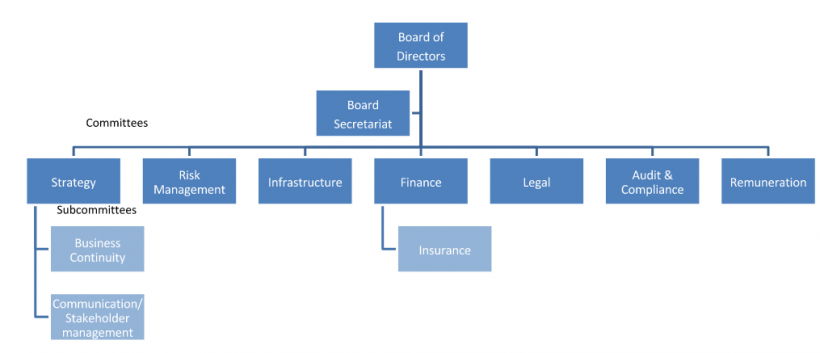Corporate Governance
Samarco’s Corporate Governance structure is formed by its shareholders BHP Billiton do Brasil Ltda. and VALE S.A. (each with a 50% interest), a Board of Directors, Advisory Committees, Executive Board, Internal Auditors and Independent Auditors. This structure provides the shareholders with an effective monitoring of Samarco’s results, assurance of legal and statutory compliance, and alignment of the values, objectives and strategies of the Company.
Board of Directors
The Board of Directors, a deliberative collegiate body, governs the Company and its main responsibilities are established in Samarco’s By-laws. The Board of Directors and The Executive Board are the management bodies of the Company.
The role of the Board is to establish SAMARCO’s general policies and guidelines, decide on SAMARCO’s strategic matters and to promote and protect the interests of SAMARCO, its shareholders and stakeholders.
The Board shall be comprised of eight members, four of whom shall be effective members and four of whom shall be alternate members. The members of the Board of Directors shall serve for 3 (three) years, reelection being permitted.
The alternate members may be present at the meetings of the Board of Directors of SAMARCO, together with their respective effective members. However, alternate members shall not have the right to vote at meetings of the Board when their respective effective members are present.
The Board of Directors shall yearly nominate its Chairman and Vice-Chairman, among its members, alternating between Directors appointed by each Shareholder (BHPBilliton and Vale). The Chairman and Vice-Chairman shall not have a casting or tie-breaking vote.
Executive Officers
Rodrigo Alvarenga Vilela
Chief Executive Officer and Director of Planning and Operations
Cristina Morgan Cavalcanti
Chief Financial Officer, Information Technology and Supplies Director
Najla Ribeiro Nazar Lamounier
Legal, Risk and Compliance Director
Reuber Luiz Neves Koury
Project and Sustainability Director
Advisory Committees Structure
The Committees are responsible for providing recommendations on topics that require Board of Directors decision (with specific assignments and for limited renewable terms). The committees shall be composed of persons appointed by the Board of Directors (not necessarily board members), who shall not have executive functions or activities.
The Committees are authorized by the Board of Directors, within the limits of the Board’s authority, to seek any information they require from any employee of the company in order to perform their duties. Moreover, they are authorized by the Board, within the limits of the Board’s authority, to investigate any activity within the scope of their terms of reference and are tasked with recommending to the Board appropriate actions emanating from their investigations.
The Committees, in order to achieve their purpose, can establish permanent and temporary Subcommittees. The Committees have no decision-making power, and their recommendations are not binding on the decisions of the board of directors. The Current Structure consists of seven Advisory Committees. There are three subcommittees set up to provide support on specific topics, leveraging specialist input from Shareholders.
Samarco’s Advisory Committees Structure:

Compliance
Compliance is a strategic area of intelligence which helps to identify and evaluate the exposure of the Company to the risks of corruption, fraud, antitrust, money laundering and violation of human rights. The area also has the objective of proposing corrections to these and other potential problems.
Samarco’s compliance practices are present in all its activities to assure that these conform to internal and external laws and regulations, and meet the requirements of the regulatory entities. The program is governed by the Company’s own Code of Conduct and other policies seeking the prevention of corruption, fraud and anticompetitive practices. The Ombudsman is one of the mechanisms which support this program.
After the failure of the Fundão dam in Mariana, the Company has continued with its compliance practices, duly updated to conform to the new circumstances.



